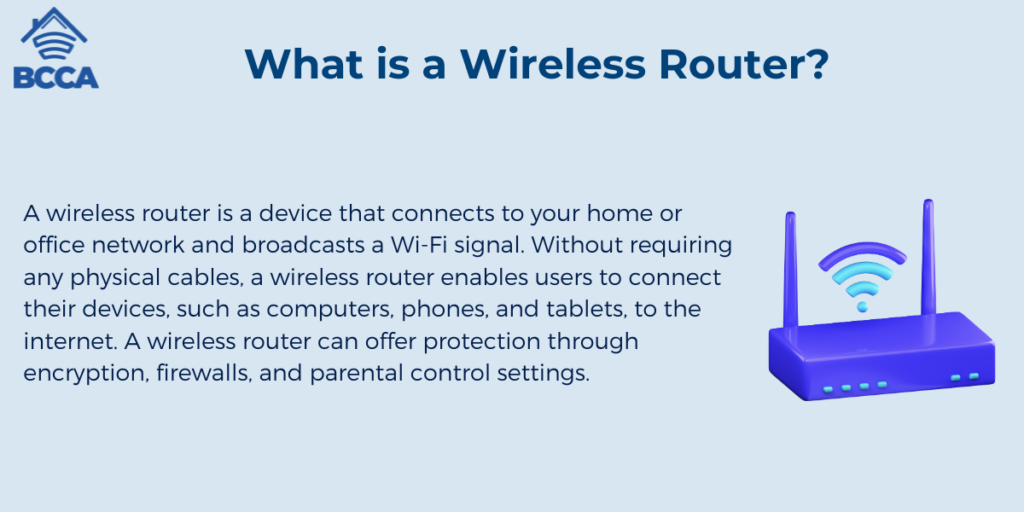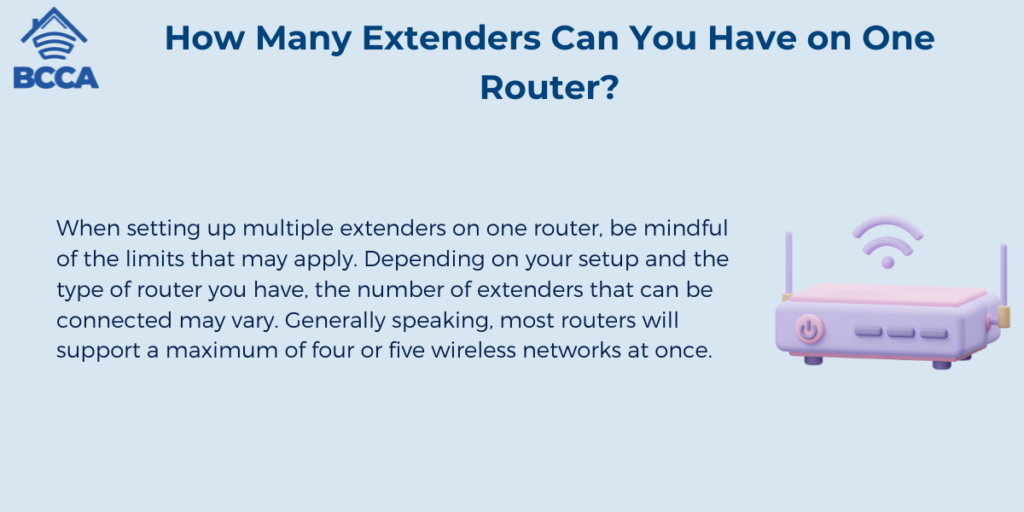When it comes to expanding the range of your home’s wireless network, many people wonder how many extenders can you have on one router. The answer is not as simple as a single number. The answer to how many extenders can you have on one router is contingent on numerous factors, such as the area’s dimensions and the type of appliances connected to your network.
In this blog post, we’ll provide an in-depth look at the factors that will affect your decision about what type of setup is best for you, as well as potential issues and solutions when using multiple extenders with one router. We’ll also discuss some common issues that may arise when using multiple extenders with one router and provide troubleshooting tips to help keep everything running smoothly.
Table of Contents
What is a Wireless Router?

A wireless router is a device that connects to your home or office network and broadcasts a Wi-Fi signal. Without requiring any physical cables, a wireless router enables users to connect their devices, such as computers, phones, and tablets, to the internet. A wireless router can offer protection through encryption, firewalls, and parental control settings.
The main benefit of using a wireless router is convenience; you can access the internet from anywhere in your home or office without having to run wires through walls or ceilings. A wireless router allows multiple users to take advantage of the same connection simultaneously rather than requiring individual connections. Finally, many routers come with advanced features such as guest networks for visitors and remote management capabilities so you can adjust settings from anywhere in the world.
Wireless routers enable multiple devices to access a single internet connection, and with the help of a Wi-Fi extender, users can further extend their wireless coverage for reliable connections in weaker signal areas. By using a Wi-Fi extender, users can extend their wireless coverage and enjoy reliable access even in areas with weak signal strength.
What is a Wi-Fi Extender?
A Wi-Fi extender is a device that expands the range of an existing wireless network. It receives the signal from your router and amplifies it, allowing for better reach in areas where the connection may be weak or limited. This device allows for a wider reach of the wireless network to be achieved, even in locations where signal strength is poor or has limited range, such as underground areas or outdoors.
The main benefit of using a Wi-Fi extender is improved coverage and reliability throughout your home or office space. An extended range can supply swifter speeds and more dependable links, irrespective of your location within the building. Moreover, multiple gadgets connected to the same network can benefit from improved performance and fewer lost connections due to weak signals.
Today, there are several different kinds of Wi-Fi extenders available for purchase; these include mesh networks, repeaters/range expanders, powerline adapters, and Wi-Fi amplifiers. Mesh networks provide whole home coverage with multiple nodes placed around your home for maximum coverage, while repeaters work best when placed halfway between your router and the area needing extended service; they also require two separate networks (one for each frequency). Powerline adapters use the existing electrical wiring in walls as a medium for transferring data, while Wi-Fi boosters/amplifiers boost weak signals from routers without creating additional networks like repeaters do.
In conclusion, a Wi-Fi extender is an essential device for expanding the range of your home network and ensuring that all areas have access to reliable internet. To avoid overloading or diminishing the performance of your system, it is crucial to comprehend how many extenders you can use with a single router.
How Many Extenders Can You Have on One Router?

When setting up multiple extenders on one router, be mindful of the limits that may apply. Depending on your setup and the type of router you have, the number of extenders that can be connected may vary. Generally speaking, most routers will support a maximum of four or five wireless networks at once.
Yet, the total number of extenders that can be linked up may hinge on how strong your router is and its capability to allocate adequate data capacity for each link.
The quantity of extenders that can be employed is also impacted by other elements, such as signal power and interferences from gadgets close to the router, like microwaves or cordless phones. If these devices are too close to your router, they can interfere with its ability to broadcast signals effectively, which could reduce its range and impact performance significantly. Additionally, if your home network has too many walls or floors between the main router and where you want coverage, then this could also limit how many extenders you’re able to use successfully in order to extend coverage throughout your home.
Maximizing network performance with multiple wi-fi extenders necessitates that all devices be situated in an ideal spot, within reach of one another, to avoid signal obstruction and still furnish adequate coverage. This will prevent interference between signals while still providing adequate coverage across all areas in need. Additionally, make sure that all hardware is up-to-date, including firmware, as older versions may not be compatible with newer technology resulting in slower speeds or even dropped connections altogether.
Finally, consider investing in higher quality products such as mesh networking systems which provide more reliable connectivity than traditional single point solutions do – especially when dealing with larger homes/spaces needing greater coverage over a wider area.
Troubleshooting Common Issues with Multiple Extenders on One Router
Troubleshooting common issues with multiple extenders on one router can be a tricky endeavor. Identifying and resolving interference issues is the first step in optimizing your network setup. Interference from other gadgets, such as microwaves or cordless phones, can diminish the effectiveness of your wireless link.
Using a Wi-Fi analyzer app, you can identify and resolve interference issues by locating any sources of disturbance in your vicinity. Once identified, you should move away any interfering devices or relocate them to another part of the house where they won’t interfere with your router’s signal strength.
Adjusting settings to improve performance is also important when troubleshooting multiple extenders on one router. You may want to adjust channel widths for better throughput or increase transmit power for better range coverage if needed. Ensure all extenders are appropriately set up to prevent any clashes between them or instabilities in the network.
If possible, try using different channels for each extender so that there isn’t too much overlap between them which could lead to decreased performance overall.
Updating firmware is another way of improving connectivity problems associated with multiple extenders on one router system. Firmware updates often contain bug fixes and new features which can help improve stability and reliability across all connected devices within the network setup itself. It is important to check for firmware updates regularly since outdated versions may not be compatible with newer routers or Wi-Fi standards like 802 11ac/ax etc.
Additionally, it is always best practice to keep all routers, and Wi-Fi Extenders updated whenever possible in order to get optimal results out of your networking hardware investments over time.
FAQs in Relation to How Many Extenders Can You Have on one Router
How many Wi-Fi extenders can I use with one router?
Multiple Wi-fi extenders work on one router. It is possible to use multiple Wi-Fi extenders with one router. The exact number of extenders depends on the type and model of your router, as well as the capabilities of each individual extender.
Generally speaking, most routers can support up to four or five Wi-Fi extenders simultaneously.
Still, it’s worth noting that having more than a couple of extenders can diminish the velocity and coverage of your web connection due to cross-interference between gadgets. Therefore, if you plan on using multiple Wi-Fi extenders in a single space, make sure they are compatible with each other and properly spaced out for optimal performance.
Can you have 2 Wi-Fi extenders on the same network?
Yes, you can have two Wi-Fi extenders on the same network. Placing the extenders in distinct spots, not too near each other, is essential to guarantee both get a decent signal from your router while avoiding any clashing or merging. This will ensure that both devices are able to receive an adequate signal from your router while avoiding any interference or overlap between them.
Additionally, if possible, try to connect one of the extenders via Ethernet cable, as this will provide a more reliable connection than wireless connections alone.
Do multiple Wi-Fi extenders slow down the internet?
No, multiple Wi-Fi extenders do not slow down your Internet. When set up appropriately, multiple wi-fi extenders offer a boost to the range and performance of your web connection by boosting the signal from your router to get to more places in your house or workspace. Multiple extenders can interact and form a mesh network, providing speeds superior to what one router could offer alone.
Conclusion
In conclusion, the answer to how many extenders can you have on one router depends on your specific network setup and what type of Wi-Fi Extender you are using. Generally, most routers should be able to accommodate up to four or five extenders linked simultaneously without significant problems. However, if you find that performance is suffering with multiple extenders in use, then it may be worth considering other solutions, such as upgrading your existing router or replacing it altogether with a more powerful model that has better range and coverage capabilities.
Take the guesswork out of setting up your wireless network with our comprehensive reviews and guides on routers, extenders, cameras, and accessories. Get started now at BCCA to find the perfect solution for your home or office needs!
Chris loves technology, specifically smart home technology! With both hands-on and executive leadership experience in his corporate career, Chris stays abreast of emerging technology and solutions and immerses himself in BCCA when not in the office.
